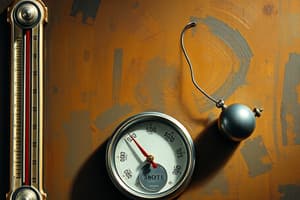Podcast
Questions and Answers
Who invented the Celsius scale?
Who invented the Celsius scale?
- William Thompson Kelvin
- Isaac Newton
- Anders Celsius (correct)
- Gabriel Daniel Fahrenheit
What is the unit of measurement for the Kelvin scale?
What is the unit of measurement for the Kelvin scale?
- Kelvins (correct)
- Degrees Fahrenheit
- Degrees Celsius
- Degrees Rankine
In which country is the Fahrenheit scale widely used?
In which country is the Fahrenheit scale widely used?
- Germany
- United States (correct)
- United Kingdom
- Canada
How many equal intervals does the Fahrenheit scale divide the temperature range into?
How many equal intervals does the Fahrenheit scale divide the temperature range into?
What hypothetical temperature is characterized by a complete absence of heat energy?
What hypothetical temperature is characterized by a complete absence of heat energy?
What happens to the average speed of molecules when the temperature increases?
What happens to the average speed of molecules when the temperature increases?
Which property does NOT change significantly with temperature?
Which property does NOT change significantly with temperature?
Which liquid is commonly used in a liquid-in-glass thermometer?
Which liquid is commonly used in a liquid-in-glass thermometer?
What temperature scale is commonly used in science?
What temperature scale is commonly used in science?
At what temperature does water boil on the Celsius scale?
At what temperature does water boil on the Celsius scale?
Flashcards
Celsius Scale Inventor
Celsius Scale Inventor
Anders Celsius, a Swedish astronomer, invented the Celsius scale in 1742.
Celsius Scale Range
Celsius Scale Range
The Celsius scale divides the temperature difference between freezing and boiling water into 100 equal parts.
Fahrenheit Scale Unit
Fahrenheit Scale Unit
The unit for the Fahrenheit scale is degrees Fahrenheit (°F).
Kelvin Scale Unit
Kelvin Scale Unit
Signup and view all the flashcards
Kelvin Scale Range
Kelvin Scale Range
Signup and view all the flashcards
Temperature
Temperature
Signup and view all the flashcards
Temperature and Molecular Motion
Temperature and Molecular Motion
Signup and view all the flashcards
Temperature Scales
Temperature Scales
Signup and view all the flashcards
Liquid-in-Glass Thermometer
Liquid-in-Glass Thermometer
Signup and view all the flashcards
Temperature's Effect on Matter
Temperature's Effect on Matter
Signup and view all the flashcards
Study Notes
Temperature Scales
- Temperature is a comparative measurement of hot or cold.
- A body that feels hot usually has a higher temperature than a similar body that feels cold.
- Temperature is a measure of the average kinetic energy of the atoms/molecules in a substance.
- As temperature rises, the average kinetic energy of the molecules increases, and the average speed of the molecules in the substance increases.
- As temperature decreases, the average kinetic energy of the molecules decreases, and the average speed of the molecules in the substance decreases.
- Common units for measuring temperature are Celsius (°C), Fahrenheit (°F), and Kelvin (K).
Celsius Scale
- Invented in 1742 by Anders Celsius.
- Divides the range of temperature between the freezing and boiling points of water into 100 equal parts.
- Temperatures on the Celsius scale are known as degrees Celsius (°C).
Fahrenheit Scale
- Established by Gabriel Daniel Fahrenheit in 1724.
- Many countries now use the Celsius scale.
- The United States uses Fahrenheit. The Fahrenheit scale divides the difference between the melting and boiling points of water into 180 equal intervals.
- Temperatures on the Fahrenheit scale are known as degrees Fahrenheit (°F).
Kelvin Scale
- Named after William Thompson Kelvin.
- A British physicist who developed it in 1848.
- Extends the Celsius scale to absolute zero.
- Absolute zero is a hypothetical temperature characterized by a complete absence of heat energy.
- Temperatures on the Kelvin scale are called Kelvins (K).
Studying That Suits You
Use AI to generate personalized quizzes and flashcards to suit your learning preferences.




